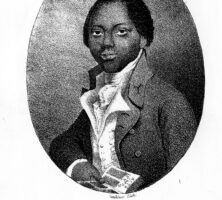Author of one of the earliest and most influential slave narratives, Olaudah Equiano was an enslaved African of Igbo descent who became a master seafarer and traveled the world. The central concerns of his extraordinary life were work on the high seas, struggles for abolition and personal emancipation, and conversion to Christianity. His experiences in royal Georgia are among his autobiography’s most dramatic.

From The Life of Olaudah Equiano, or Gustavus Vassa, the African, by O. Equiano
Equiano, born around 1745, recounts in The Interesting Narrative of the Life of Olaudah Equiano, or Gustavus Vassa, the African the memories of his childhood in an inland village of present-day Nigeria, the shock of his kidnapping and transport to the coast, the agony of separation from his family, and the horror of the Middle Passage. (Some scholars, notably Vincent Carretta, have questioned the authenticity of this part of his story, citing evidence for a South Carolina birthplace; the issue is not settled.)
Equiano writes that he was sold at age eleven to Michael Pascal, a Royal Navy lieutenant who took a slave owner’s prerogative and renamed him Gustavus Vassa after a sixteenth-century Swedish king. With Pascal, Equiano learned seafaring; from his childhood, he saw naval action in the Canadian and Mediterranean theaters of the Seven Years’ War (1756-63). In 1762, believing his manumission imminent, Equiano was stunned when Pascal sold him to captain James Doran, who in turn sold him to Robert King of Montserrat, a Quaker. Traveling the West Indies–North American coastal circuit, Equiano became a skilled mariner.
Savannah looms large in Equiano’s narrative. King’s vessels shipped many enslaved Africans from the Caribbean as part of the Atlantic slave trade to Savannah. Equiano also plied the Savannah River as a trader working on both his master’s account and his own, hoping eventually to purchase his freedom, which he accomplished on Montserrat in 1766.
Equiano’s vivid accounts of navigating alligator-infested waters in Georgia, as well as the many “impositions” he suffered at white men’s hands, are rich in incident: a serious febrile illness from overwork in 1764; a near fatal beating by a drunken local slaveholder and his overseer in 1765; repeated kidnapping attempts suffered as a free man at the hands of slave patrollers and other whites; abuse and assault from various quarters, including a belligerent enslaved man in Savannah; and fraudulent dealings by whites who thought a Black man an easy target.
Kinder memories of Savannah include the gentle care of a white physician, Dr. Brady, who cared for Equiano after the beating in 1765, and warm companionship among African Americans, including a friendship with an enslaved woman named Mosa. Historian and biographer Carretta demonstrates that Equiano heard the celebrated Methodist preacher George Whitefield deliver a sermon in Savannah in February 1765 (although in his narrative Equiano says he heard the preacher in Philadelphia in early 1766). Savannah harbor is also the scene of a tragicomic 1766 incident: a dying silversmith promises Equiano and his master riches in gratitude for their care; his treasure chest subsequently proves empty.
Equiano’s terse account of his final adieu to Georgia, though, is unsparing: in late spring 1767, he took his “final leave” of a colony where “the treatment I had received in it disgusted me very much against the place.” Such were his feelings, indeed, about much of the “American quarter of the globe.”
Later travels included accompanying Phipps’s 1773 Arctic expedition and journeying to Central America’s Mosquito Coast, Italy, Portugal, and Turkey. He participated in a colonization scheme to “return” U.S. Blacks to Africa but was fired for denouncing embezzlement. Equiano was around forty-four when his Interesting Narrative was published in London in 1789. This powerful text was a considerable achievement, as was its publication. Equiano sold subscriptions to finance the book and toured widely, promoting it and the antislavery cause. He is widely viewed as the founder of African American autobiography.
Equiano died in London on March 31, 1797.






